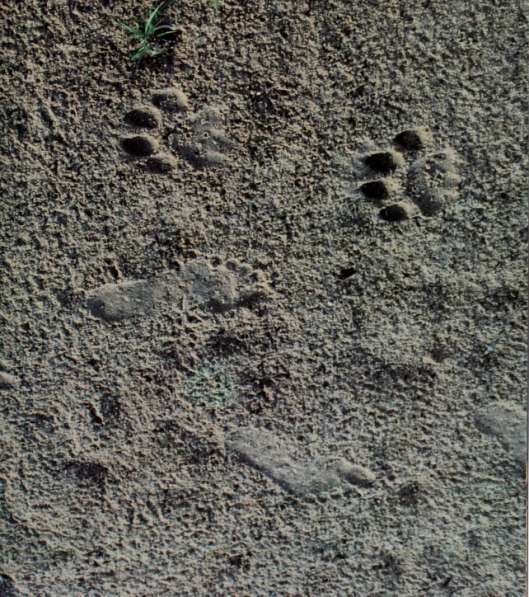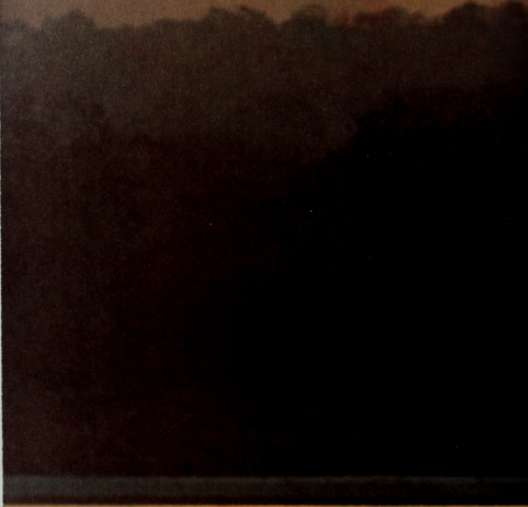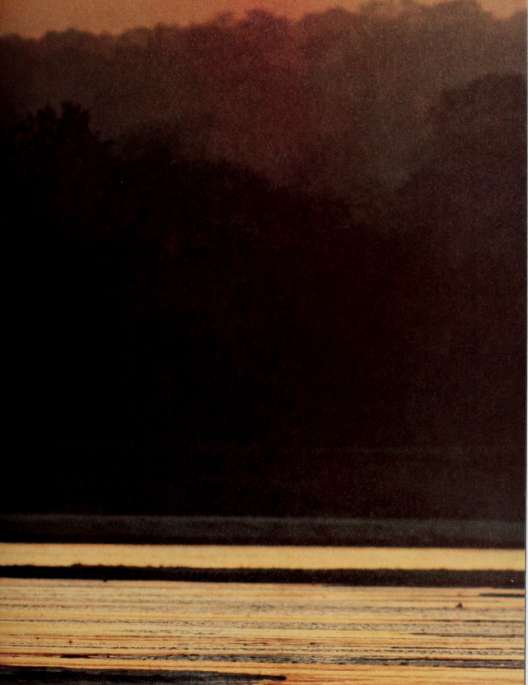Sand rivers (29 page)

Yet seeing the innocent beast lie down again, it was clear how simple it would be to shoot this near-blind creature that keeps so close to its home thickets, that has no enemies except this upright, evil-smelling
/
tH lltttt. K*'
■ * ■ 5|tj6

-*^^^i^ - ^**'^^^,-:^
f
^
i^
%


4
■^MtariUKaaABHU^HMMiaw^' ■'»••
^-

■H'.t'-
'^'
if>^
'^r
t \
V,V/,*;
s
•1» r.

y>-. ^s_"ijS(


SAND RIVERS
shadow, so recent in its ancient world, against which it has evolved no defense. Its rough prong of compacted hair would be hacked off with a panga and shoved into a gunny sack as the triumphant voice of man moved onward, leaving behind in the African silence the dead weight of the carcass, the end-product of millions of browsing, sun-filled mornings, as the dependent calf emerges from the thicket, and stands by dumbly to await the lion.
We head northeast into dry grassy hills. Big pink-lavender grasshoppers rise and sail away on the hot wind, the burring of their flight as dry and scratchy as the long grass and the baked black rock, the hard red lateritic earth, the crust of Africa. To the west rise rough black escarpments, and beyond the escarpments an emptiness in the air, arising from the depression of the Luwegu's valley. Tov/ard the southwest border of the Reserve shrouds of dull smoke ascend to the full fire clouds, all across the Mbarika Mountains.
The path descends into inland valleys of dry thorn scrub and long clinging strands of shrub combretum, then small sand rivers of sweet musky smells and cat-mint stink where crested guinea fowl, a shy forest species, run away cackling under the thickets. But there is no water, and because of their extra loads of meat and the strain caused by the encounter with the rhino, the porters are already tired before noon. To Brian's annoyance, they keep falling far behind. "It's very easy to get lost in bush like this," he mutters. "They must stay together."
Beneath borassus palms a small trickle of good water runs along the bed of a karonga, but under the red banks a juvenile elephant is swatting its legs with a fan of fresh-broken branches, and across the ditch at the wood's edge a cow moves back and forth in agitation; then a second cow with a smaller calf moves into view and disappears again. It is hard to tell how many elephants are here, or where they are, but the nearest among them are a lot too close. Uneasily, the porters set their loads down, all but the small wide-eyed Shamu, who stares astonished at the elephants like a little boy. Goa says sharply, "Tua!" (literally, "to land") - "Put your load down!" And Shamu does so as the second cow emerges part-way from the nearest thicket, ears flared out, and drives us back with a loud blare of warning. The confused calf in the karonga tries clumsily to climb the bank, and a third elephant, until now unseen - doubtless the mother of a calf we have not seen either - comes for us across the karonga. "Kimbiya!" Goa tells the porters. "Run!" The Ngindo scatter off into the bush, and the rest of us back up rapidly for the second time today. But the cow has stopped behind that wall of vines; we wait and listen while a boubou, startled out of its bush by the elephant, flies across the karonga and resumes its duet without a care.
The calf in the karonga is safely away, and the other calves are, too; we do not see the elephants again. Those in the bush right in front of us have simply vanished, so silently and so magically that even Brian can't
(Precedingpage) Water-buck on the Mbarangandu delta.
PETER MATTHIESSEN
quite believe it, and goes poking about in the bush in a gingerly way, just to make sure. Meanwhile, the porters have traveled so fast and so far that we have trouble reassembling them. "We lost track of ourselves," Mata admits, in the wonderful translation of Kazungu. We cross the karonga, drink warm water, and rest in the cool green shadow of an afzelia. Brian is pensive. "Have to be very careful with these animals, more careful than usual. I don't want to provoke a charge if 1 can help it. We're a long way from help, you know, if somebody gets hurt, and there's no track for bringing in a Land Rover. These emergencies can happen very fast, even when you see the animals and take pains with them, as we did here." He shakes his head. "What you don't want is to have one elephant cut off from the others. You try to make certain that they're all gone past before you push ahead, but sometimes in dense thicket like this, there's one that's slow or old that you don't see, and then there's trouble."
I am content that the Warden is being careful, and after all these encounters 1 have complete confidence in his nerve and expertise.
"One time, up on the Ruaha River - and by the way, we have more of the Ruaha right here in the Selous, about seventy miles of it, than they have in the Ruaha National Park -1 had an elephant get in among my porters after I'd gone past. Chased one poor devil way off into the bundu, hot after him, you know, squealing like hell. Usually an elephant is quiet when it comes for you, at least until it's right on top of you; that's when it starts to yell. But this old cow yelled all the way, so we knew just where to follow. Kept coming on scraps of the porter's clothes - the turban he wrapped up on his head to cushion his load, then his shirt, his shuka - everything! He was running naked! But there was no sign of the body, so we kept on calling. After half an hour we reckoned that the poor chap must be a goner. We kept on calling, Hoo! - and suddenly, from a great distance, we heard, Hoo! The chap returned on his own two feet, all scratched and scared, but he was in one piece. Those clothes had saved him. Hadn't thought to shed them, they were just ripped off by the thorns, because with that elephant behind him he wasn't fussy about his route, he just went moja kwa moja, straight on through. But the clothes distracted that old cow just enough to slow her down. He never knew whether he'd outrun her or eluded her; he'd just kept running flat out, he said, until he realized that there was no more noise behind him."
We have hardly started out, toward three, when we run into more trouble. From a deep thicket comes a profound ominous mutter. Exasperated by the failure of the porters to keep up despite their hard experience this morning, the Warden begins a low muttering of his own. "What are these old cows so cross about?" he frets, cautioning the oncoming porters to be quiet. At that moment, the hidden elephant gives a loud and scary blare of warning close at hand - too close for the shot nerves of the Ngindo, who drop their loads and flee without further ado.
SAND RIVERS
As Goa and Brian exchange guns, and Brian jams cartridges into the chamber, a Sykes monkey gives its loud yowp of alarm, and there comes a single sharp loud crack of breaking wood, then a dead silence. After a few minutes, when nothing happens, the porters are whistled for, and come in very quietly, one by one, grab up their loads, and flee again, loads to their chest. Not one was smiling. The porters are choka sana, very tired, from carrying the extra loads of meat and from the strain of all these encounters with big animals, and for the first time on the safari feel free to say so. "These elephants really made a pest of themselves today," Abdallah sighs as we pause to sip water from a ditch.